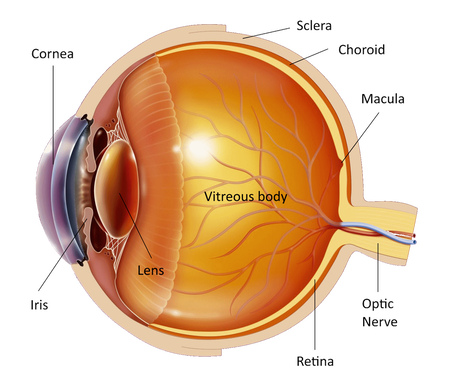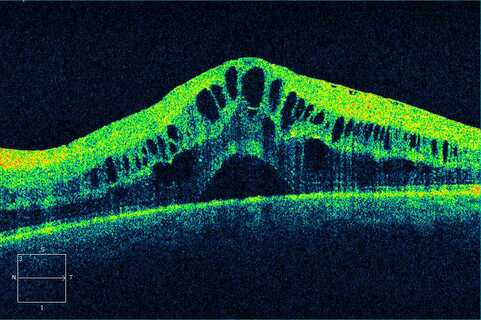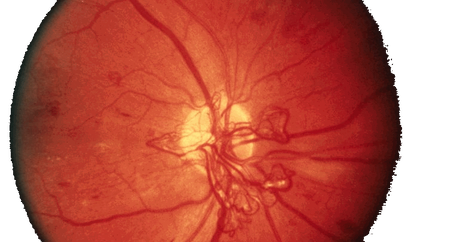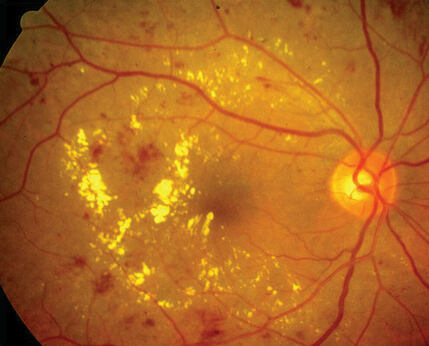Diabetic retinopathy
Diabetes mellitus is a disease where the body cannot control the level of the blood sugar and other carbohydrates. It may start at a young age but it usually starts in adult life. It may cause complications that appear in many different parts of the body. There are 2 kinds of diabetes: one is controlled with insulin and the other with pills or diet but they both can affect the eyes the same way and can even lead to blindness.
If you have diabetes it doesn't mean that your eyes will be affected but you surely have more chances for this to happen. If your diabetes is well controlled it is less likely for you to have eye problems or if you have they will be less severe. Vision loss from diabetes can usually be prevented if diagnosed on time. Because it is very easy not to know that your eyes have already been affected by diabetes it is imperative to have regular eye check-ups. The eye is like a photographic camera. It has the lens and an opening in front that help in the focusing of the objects on the retina. The retina is a thin membrane that is sensitive to the light, as the film in the photographic camera. The macula is found in the center of the retina, where the light focuses. It is responsible for what we see in front of us, for activities such as writing and reading and for the perception of colors. The rest of the retina is responsible for the peripheral vision. The cavity in front of the retina is full of a transparent jelly like substance that is called vitreous body. Diabetes can affect the eye in many ways by altering the thin network of the retinal blood vessels, a disease called diabetic retinopathy. You may notice blurry vision in the first days or weeks after the beginning of the diabetic therapy. This is due to a swelling of the lens of the eye and is temporary until the diabetes gets under control. Diabetics are more prone to the development of cataract, which can be successfully treated with an operation. The most severe eye complication of diabetes is diabetic retinopathy.The lighter form of the disease, called "non proliferative diabetic retinopathy", is very common to those who are diabetics for many years. In this form of the disease you have changes in your eyes but your vision is not threatened. 
A more severe form of the disease is called "diabetic maculopathy", where the blood vessels start leaking. If the macula gets affected then the central vision is gradually worsened and it is difficult for you to recognize faces from far away or read. The degree of visual deterioration is variable from one person to another but the peripheral vision, that allows you to move, remains unaffected. It is very rare to loose all of your sight.

Sometimes diabetes can cause occlusion of the retinal blood vessels. If this happens then new blood vessels are formed in the eye, as nature is trying to correct the problem and supply the eye with blood. This is called "proliferative diabetic retinopathy". Unfortunately, these blood vessels are of bad quality, feeble and are formed in the wrong part of the eye - on the retinal surface and inside the vitreous cavity. As a consequence, they bleed easily and form scar tissue inside the eye. This tissue pulls and deforms the retina. When the retina gets detached from its place then we have what we call a "retinal detachment".
Proliferative diabetic retinopathy is more rare than non proliferative diabetic retinopathy and affects more often diabetics on insulin for many years. The new blood vessels can rarely directly affect your vision but their consequences, such as hemorrhage or retinal detachment, can cause a sudden drop in your visual acuity. Without treatment all of your vision may be lost, but with prompt treatment this can be avoided in most cases. Therefore, you will need to check your eyes at least once a year by an ophthalmologist before your vision starts to deteriorate. 
The appropriate treatment for diabetic retinopathy threatening vision is laser. You must know however that laser is done to mainly preserve vision, although in some cases you may see better.
Laser is light that can focus on the retina with high precision. Thus we can close the leaking retinal blood vessels. If new blood vessels are formed then a more extensive laser is applied, which may need to be repeated and in 80% of cases causes regression of the new blood vessels. Laser is done in the clinic and is usually painless. After you have drops put in your eyes to dilate the pupil you sit on the slit lamp, a special contact lens is put on the cornea to help focus the laser on the retina and you will see many strong flashes of light. The treatment for the leaking blood vessels doesn't last long. The treatment for the new blood vessels however lasts longer and sometimes can be painful. If this is the case then a local anesthetic injection can be done around your eye to relieve you. The side effects of laser for the leaking blood vessels may be a small reduction in visual acuity. The side effects of laser for the new blood vessels may be more prominent. Part of your peripheral vision is often lost and you may not be able to drive in the future. Your night vision and the perception of colors may also be affected. Sometimes the central vision after the treatment is not as good as it was before the laser but this is usually temporary. It is very important however to know that there is no treatment without side effects and that the dangers from no treatment are far greater than those from laser itself. The laser light is very strong and can blur your vision for a few hours after the treatment. You may also have a headache after the laser in which case don't hesitate to take some painkillers. But if the pain is very strong or your vision gets much worse than you will have to consult your doctor immediately. If diabetic retinopathy is very advanced and causes retinal detachment and scar tissue then a special operation called "vitrectomy" will be required. If you have any questions about your disease or its treatment do not hesitate to consult you doctor, who will discuss it in details with you. |
|
|
||||
The information provided in this web site is not a substitute for professional medical care by a qualified doctor or health care professional. Always check with your doctor if you have concerns about your eye condition or treatment. The authors of this web site are not responsible or liable, directly or indirectly, for any form of damages whatsoever resulting from the information contained in or implied by the information on this site. Information for patients is provided only as a guide.
Copyright Vlassis Grigoropoulos © 2020
Copyright Vlassis Grigoropoulos © 2020
Design: Vlassis Grigoropoulos
Proudly powered by Weebly






